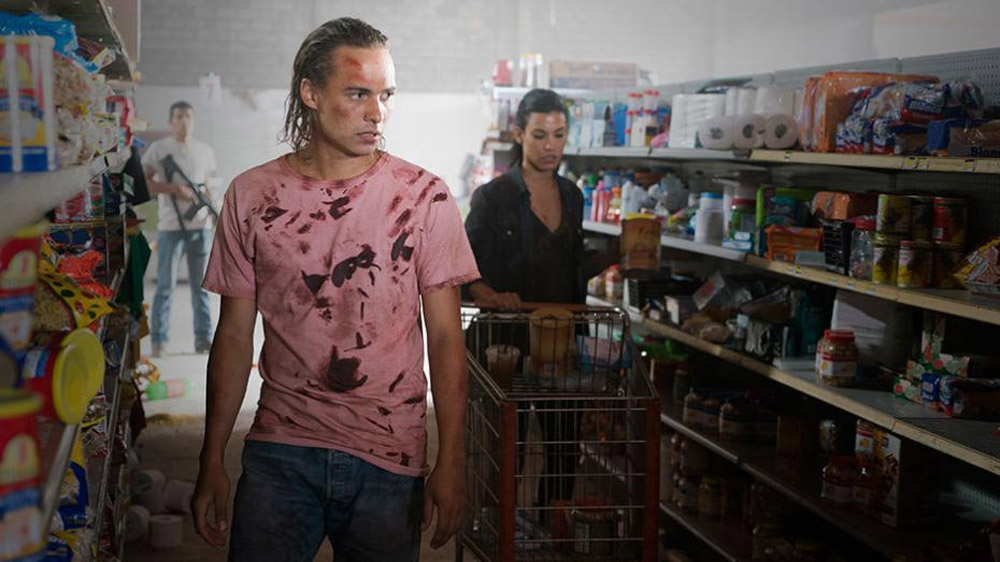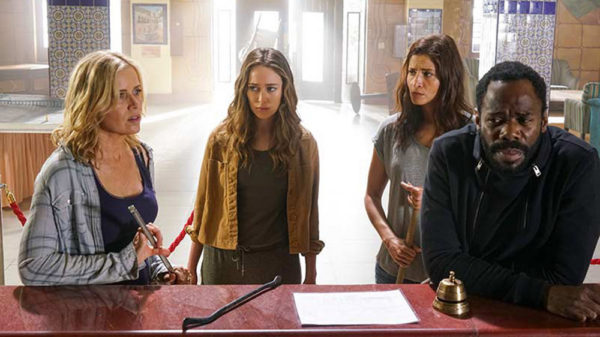Fear the Walking Dead is a show capable of great things.
The potential is there for a compelling drama that mixes thoughtful character work with potent horror and social commentary. So why does it keep delivering mediocre results?
That’s a question that feels especially relevant after Fear’s latest episode, ‘Los Muertos’, which plays with some fascinating and untapped themes but continually skims the surface in actually exploring them.
It’s a bland, shallow instalment that bears the brief façade of a multi-faceted thesis on the value of hope and faith, but on reflection crumbles into a hodgepodge of platitudes and unexciting morsels of back-story. It’s passable, and vaguely entertaining, but the dissonance between the authorial intention and the actual end result is larger than it’s ever been here.
Unlike last week, ‘Los Muertos’ splits itself between multiple plotlines: Nick’s time in the Tijuana colony, Strand and Madison’s ‘meaningful’ drunk chat in a hotel bar and Alicia and Ofelia’s trip through the eerily quiet hotel. The choice to explore multiple stories at once rather than making the rounds week by week is theoretically a boon for pacing and story momentum, but ‘Los Muertos’ seems to use its multiple plotlines as an excuse for a lethargic approach that sees each story barely inch forward.
That’s illustrated particularly in the way in which the stories intertwine: through frantic intercutting after one scene each that doesn’t allow each (minor) development to really make an impact. The intercutting creates a choppy and uneven feel, exacerbated by the thin thematic links between the storylines: there’s a vague overarching theme of contrasting hope and faith, but neither story explores that theme in enough depth for the contrast to really develop in any way.
‘Los Muertos’, therefore, suffers from the classic problem of any show with a badly balanced cast: it impedes itself with the presentation of two storylines that don’t complement one another, creating a sense that very little, overall, has actually happened of note.

Arguably, the most interesting story is Nick’s. There’s some solid and intriguing world-building to be found here regarding the hierarchy of the new world; the vague and nebulous threat of the criminal gang last week is greatly expanded upon here with a potent visual exploration of the ways in which they violently cultivate their influence.
The sight, for instance, of the refugee camp situated inside the supermarket, guarded heavily by armed gang members, is a great deal more powerful and meaningful than most of the episode’s manifold speeches because it succinctly communicates an idea necessary to the plot (that there are sickly people in need of medical assistance) while possessing enough ambiguity to invite further thought about how the sick and ill fit into this new system.
However, the exploration of the unique ideology behind the community’s strange death rituals and beliefs serves as one of the primary examples of how shallow ‘Los Muertos’ ends up coming across in its execution of the great concepts it has. The opening ritual where a man walks into a crowd of walkers is shocking and surprising, but it’s not substantiated in any way by the hopelessly generic shtick that’s spouted by Luciana and leader Alejandro as justification.
The idea that the world is being cleansed is not only a dull, unimaginative cliché that’s been trotted out dozens of times before – it’s an interpretation that Fear more or less covered itself earlier this season in ‘We All Fall Down’. Fear is evidently pinning a lot on this exploration of Mexican culture and its unique relationship with death as a central facet of this half-season, so it’s disappointing that it’s putting all this stock into reheated rhetoric as opposed to a vibrant and genuinely original new take on death that would easily fuel this run of episodes.
The twist that the doctor of the colony has supposedly survived a zombie bite is relatively intriguing on a basic ‘that’s new’ level, but it’s really very difficult to actually believe that Fear will go through with irrevocably changing the threat of the walkers on both this and the parent show.
It’s too big a potential change to the mythology to swallow (especially given the very cautious feel of much of this season), so it’s very hard to buy that Nick’s on board with the beliefs by the end of the episode. Nick’s initial incredulity makes sense, but his sudden switch is abrupt and poorly justified by a shallow and brief conversation with the doctor, which once again regresses Nick back to the excessive gullibility that provoked his big decision in ‘Shiva’.
Over in the hotel, ‘Los Muertos’ generally succumbs to its worst instincts. Strand and Madison’s plot is clearly intended to be a deep and meaningful insight into the despairing psyche of two characters who have suffered enormous personal losses, but it’s badly undermined by the utterly asinine behaviour of the characters throughout.
Every major twist or conversation in this plot is sparked by an inexplicably dumb decision (drinking themselves into a stupor, loudly playing the piano) that lays bare the contrivances and artificiality of the writing that railroads the characters to where the plot needs them to go, and the ensuing insights are barely even worth it. Madison’s despairing comments about Nick and revelation that his father committed suicide are, like the community’s rhetoric, interesting enough but far too insubstantial to carry the weight that the episode needs them to, and the doling out of back-story is somewhat perfunctory due to the fact that all of the insights could very easily just be inferred from previous episodes anyway.
Meanwhile, while Ofelia and Alicia’s story offers up some decent jump-scares and a satisfying level of tension throughout as the nebulous threat of walkers lurks just outside of their view, it generally consists of the two characters saying the episode’s themes to one another.
‘Los Muertos’ tells, rather than showing time and time again with clunky and obvious dialogue that just spells out the characters’ conflicts with minimal subtext or depth, which unfortunately means that a potentially great story on paper often just plods along with little energy and vitality to its execution.

This isn’t a bad episode – and if every compliment in this review seems back-handed and reluctant, then it’s worth pointing out that Fear has reached a plateau of basic, acceptable competency. It’s working its way through the ensemble and the dynamics therein, and there is some genuine progress on that front – Alicia, a bit of a background character for most of this season, assumes a promising new role as a proactive beacon of hope that seems more befitting of the talent Alicia Debnam-Carey displayed on The 100.
The show is, also, certainly going somewhere interesting with Nick’s story, and if Fear capitalises on the darker glimpses of fanaticism lurking beneath its rhetoric, it could pull off a clever deconstruction of the herd mentality that possessed little substance here.
However, that’s all potential, and Fear has always had potential. From the pilot, it’s promised that the next episode after it will be the one that really fulfils the pre-release promises of a vital and credible addition to the Walking Dead universe, but it continues to fall short of that goal while choosing the path of least resistance on a frustrating number of occasions.
We’re well over a season and a half into the series’ run, so has the show’s early grace period run out? At this point, is it still acceptable for Fear to keep coasting by on a vague promise that something better might be around the corner?
Time will tell, but it’s becoming harder and harder to believe those promises.
![]()
Aired at 9pm on Monday 29 August 2016 on AMC UK.
Buy the Season 1 box set on Amazon here.
What did you think of this week’s episode? Let us know below…

